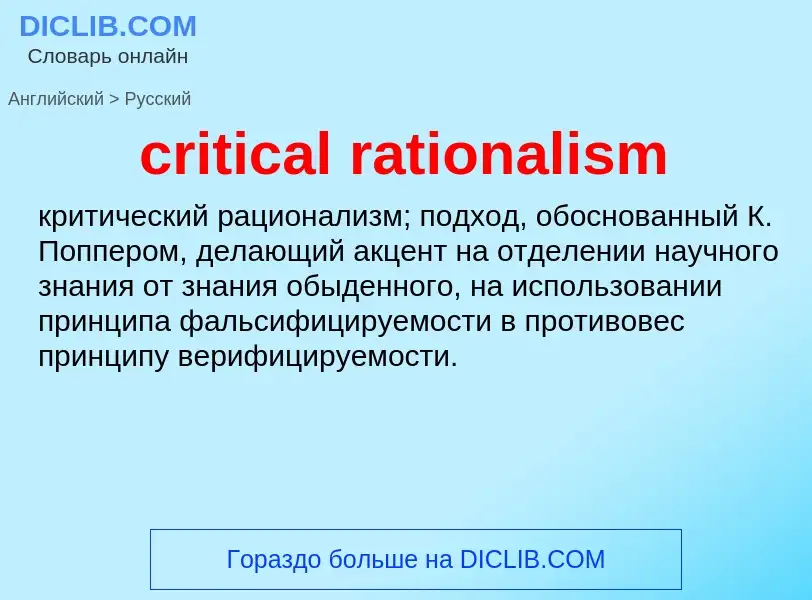Translation and analysis of words by ChatGPT artificial intelligence
On this page you can get a detailed analysis of a word or phrase, produced by the best artificial intelligence technology to date:
- how the word is used
- frequency of use
- it is used more often in oral or written speech
- word translation options
- usage examples (several phrases with translation)
- etymology
critical rationalism - translation to russian
Definition
Wikipedia
Critical rationalism is an epistemological philosophy advanced by Karl Popper on the basis that, if a statement cannot be logically deduced (from what is known), it might nevertheless be possible to logically falsify it. Following Hume, Popper rejected any inductive logic that is ampliative, i.e., any logic that can provide more knowledge than deductive logic. In other words if we cannot assert it logically, we should at the least try to logically falsify it, which led Popper to his falsifiability criterion.
Popper wrote about critical rationalism in many works, including: The Logic of Scientific Discovery (1934/1959), The Open Society and its Enemies (1945), Conjectures and Refutations (1963), Unended Quest (1976), and The Myth of the Framework (1994).

![induce]] them from observational data. Such "proof" would require us to infer a general rule from a number of individual cases, which can have predictive use but is inadmissible by the rules of logic. However, if we find one single black swan, logic allows us to conclude that the statement that all swans are white is false. Falsificationism thus strives for questioning, for falsification, of hypotheses instead of proving them. induce]] them from observational data. Such "proof" would require us to infer a general rule from a number of individual cases, which can have predictive use but is inadmissible by the rules of logic. However, if we find one single black swan, logic allows us to conclude that the statement that all swans are white is false. Falsificationism thus strives for questioning, for falsification, of hypotheses instead of proving them.](https://commons.wikimedia.org/wiki/Special:FilePath/Black Swans.jpg?width=200)
![[[Ibn Sina]] Portrait on Silver Vase [[Ibn Sina]] Portrait on Silver Vase](https://commons.wikimedia.org/wiki/Special:FilePath/Avicenna Portrait on Silver Vase - Museum at BuAli Sina (Avicenna) Mausoleum - Hamadan - Western Iran (7423560860).jpg?width=200)
![[[Plato]] in ''[[The School of Athens]]'', by [[Raphael]] [[Plato]] in ''[[The School of Athens]]'', by [[Raphael]]](https://commons.wikimedia.org/wiki/Special:FilePath/Plato by Raphael.png?width=200)
![Detail of Pythagoras with a tablet of ratios, numbers sacred to the Pythagoreans, from ''[[The School of Athens]]'' by [[Raphael]]. [[Vatican Palace]], [[Vatican City]] Detail of Pythagoras with a tablet of ratios, numbers sacred to the Pythagoreans, from ''[[The School of Athens]]'' by [[Raphael]]. [[Vatican Palace]], [[Vatican City]]](https://commons.wikimedia.org/wiki/Special:FilePath/Pythagoras with tablet of ratios.jpg?width=200)
